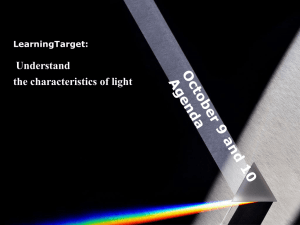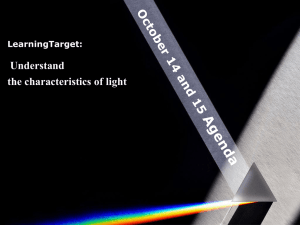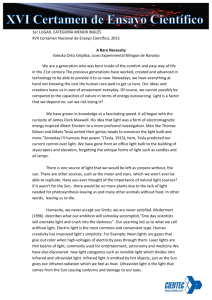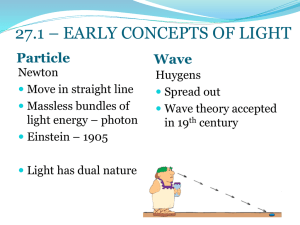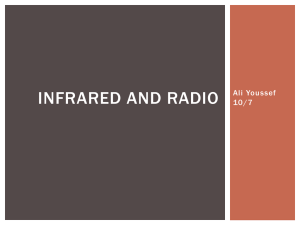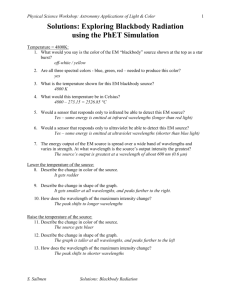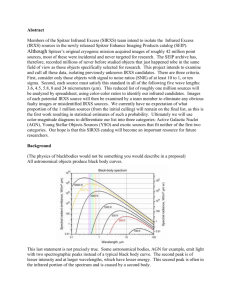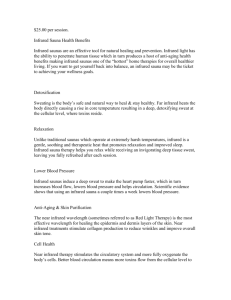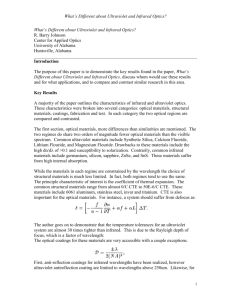powerpoint
advertisement
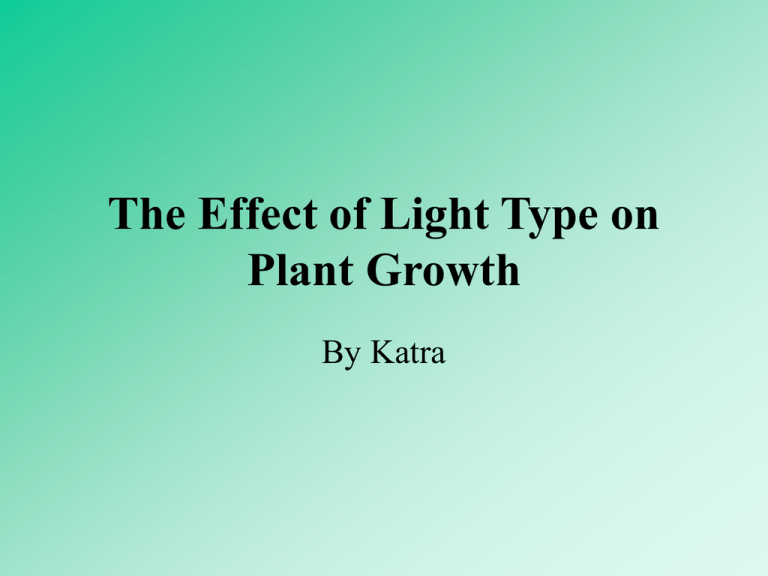
The Effect of Light Type on Plant Growth By Katra Why is it important? • • Certain plants only The environment grow well in certain around the world is conditions, partly due constantly changingto light. If the type of due to that,the amount light plants need to and type of light plants grow well is deterreceive changes too. mined, more plants Figuring out how this would be able to grow affects plants could in more places, help us learn to improving the stabilize the variables agriculture as a whole. and help plants grow. Ultraviolet Light • Wavelength- The distance between two “waves” of light traveling through space. • UV Light has a very short wavelength, invisible to the human eye. • UV light is responsible for sunburns. Infrared Light • Is on the other end of the spectrum from UV light, has a long wavelength. • Most objects emit energy at infrared wavelengths. • Often invisible. Waves are thermal. Photosynthesis • Plants turn sunlight, water, and air, into sugar,and convert it into fuel by cellular respiration. • Formula 6H2O+6CO2---> C6H1206+6O2, or 6 water molecules,plus 6 carbon dioxide molecules,-> make 1 sugar molecule plus 6 oxygen molecules. Background Information • Plants and light tie tightly into one another in the natural world, because without light plants would die, and thus without plants, over a period of time species all over the world would die out. How it relates to the Focus • The main purpose of this experiment was to find how Ultraviolet and Infrared light affected the growth of plants. • The plants were monitored under a purple light, a red, and in regular daylight. • What was supposed to be shown were the changes that might have occurred to plants receiving similar light in nature. Experimental Design Diagram Title: The effect of different types of light on plant growth. Hypothesis: If a plant receives light with longer wavelengths, then it’s likely to grow better than a plant receiving shorter wavelengths. IV: Types of light (wavelengths) Control: Regular Daylight Infrared Light Ultraviolet Light 8 Trials 8 Trials 8 Trials EDD... DV: Growth of Plant (centimeters) General Specific Type of Plant Bean Seedling Amount of Light 8 Hours Amount of Water 20mL Amount of Seeds per Pot 8 Amount of Soil 18 cm Depth of Seed 8 cm Procedure •Put 18 centimeters of soil into 3 pots 20 centimeters tall. •Then plant 8 pea seeds 8 cm deep and 3 cm apart from each other. •After that water each pot with 20 mL of water. •Place the control by a window and the other two pots in the basement, one under an Ultraviolet lamp, the other under an Infrared. •Water all plants with 20 mL of water every other day for six weeks, starting Monday. •Measure the plant growth for each seedling (in centimeters) once a week for six weeks. Derived Data Tables Growth (cm) Mean Median Range Maximum Minimum Trials Infrared Data Weeks 11/14/01 11/21/01 11/28/01 12/5/01 12/12/01 12/19/01 Infrared 2.75 2.625 3.5625 3.5625 0 7 Ultraviolet Control 2.8125 4.625 2.8125 4 6.5 4.625 6.5 4.625 0 0 7 7 Ultraviolet 0 2.1875 3.5625 2.625 2.75 0 0 6.5 3.625 2.625 2.8125 0 Control 0 1.1875 4 4.375 4.625 0 Graph #1 Graph #2 Explaining the Results/Trends • In general, each plant grew a particular way, the control growing the healthiest in the long run, infrared growing quickly and green, but dying soon, and ultraviolet growing tall and thin, pale and leafless. Relating to the Environment •The main idea was to discover how plants in different environments receiving different amounts of light would grow differently, because of their living circumstances. • In this experiment, daylight represented natural “white light”, the purple lamps the ultraviolet light, and the red lamp the infrared light. Possible Problems • Bacteria might have affected individual plant growth. • Light amount and strength may have varied. • The distances seeds were planted and soil/air differences are also possible errors. Topics for Further Study • Stars- what they’re made of, how they effect Earth and other objects. • Plants- learning in more detail about how they function and aid our world. • Light- Also learning more about the specific wavelengths and types. • Physics- Discovering how particles comprise the different parts of our existence. Overall... • It was seen that plants that receive light in the middle of the wavelength spectrum (regular daylight) grow the best. • Plants getting Ultraviolet light grow very tall, but sickly, never very healthy and dying quickly. • And plants with Infrared light grow very green and leafy fast, not growing very tall, and also dying soon. Bibliography • UV Sun- imagers.gsfc.nasa.gov/ems/uv.html • Visible/Infrared Orion- sofia.arc.nasa.gov/Sofia/ science/sofia_sci.html • Water Plants- graphics.stanford.edu/courses/ cs448c-00-fall/ The End
